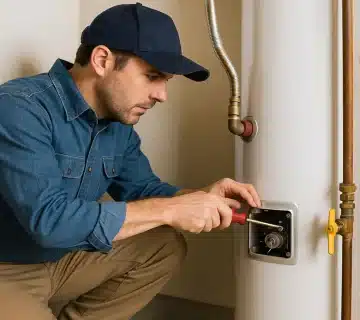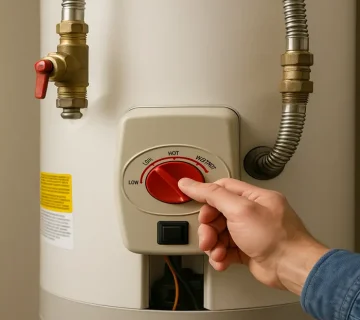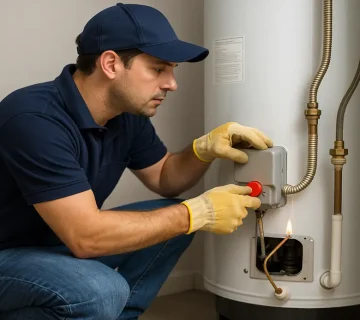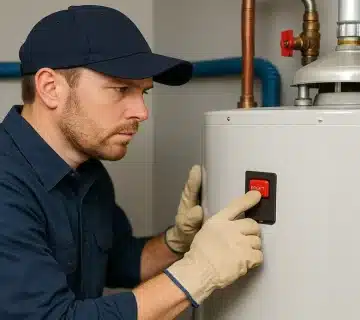Extend water heater lifespan to ensure consistent warm water for showers, cleaning, and other daily needs. A water heater is one of the most essential appliances in any household. Proper maintenance and smart usage are key to extend water heater lifespan, saving you money and avoiding the inconvenience of sudden breakdowns. Here are 10 proven tips to help you extend water heater lifespan and maintain its efficiency.
1. Flush the Tank to Extend Water Heater Lifespan
Over time, sediment and mineral deposits accumulate at the bottom of your water heater tank. These sediments can reduce efficiency and cause corrosion, leading to early failure. To prevent this:
- Drain the tank at least once a year.
- Flush out the sediments by letting fresh water flow through it until the water runs clear.
This simple maintenance step can prevent unnecessary wear and tear on your water heater.
2. Inspect the Anode Rod to Extend Water Heater Lifespan
The anode rod, also known as the “sacrificial rod,” prevents the tank from rusting by attracting corrosive elements. Over time, this rod deteriorates and needs replacement.
- Check the anode rod every 2-3 years.
- Replace it when it’s heavily corroded or less than ½ inch thick.
A functioning anode rod is critical for the longevity of your water heater.
3. Use a Water Softener to Extend Water Heater Lifespan
If you live in an area with hard water, mineral buildup inside the tank and pipes can accelerate wear and reduce efficiency. Installing a water softener will:
- Minimize mineral deposits.
- Protect your water heater and plumbing system.
This investment can save you significant repair and replacement costs in the long run.
4. Set the Temperature to the Right Level
Keeping your water heater’s thermostat too high can cause unnecessary strain on the system and increase energy consumption.
- Set the temperature to 120°F (49°C) for optimal performance.
- Lowering the temperature reduces the risk of scalding and prevents overheating.
This not only extends the heater’s lifespan but also saves on energy bills.
5. Schedule Maintenance to Extend Water Heater Lifespan
Annual professional inspections can identify and address potential problems before they become major issues. During a maintenance check, a technician will:
- Inspect for leaks and corrosion.
- Test the pressure relief valve.
- Check the thermostat and heating elements.
Professional maintenance ensures your water heater operates efficiently and safely.
6. Insulate the Tank and Pipes to Extend Water Heater Lifespan
Insulating your water heater and its pipes reduces heat loss, improving efficiency and reducing strain on the system.
- Use a water heater insulation blanket for the tank.
- Wrap foam insulation around exposed hot water pipes.
This is especially important in colder climates where heat loss is more pronounced.
7. Test the Pressure Relief Valve
The pressure relief valve is a safety mechanism that releases excess pressure from the tank. A faulty valve can lead to dangerous pressure buildup.
- Test the valve every 6-12 months by lifting the lever and letting it snap back.
- If water doesn’t flow or the valve leaks, replace it immediately.
Keeping this valve functional is essential for your safety and the heater’s durability.
8. Avoid Overworking the System
Constantly running out of hot water can indicate that your system is overworked. To avoid this:
- Use water-efficient fixtures like low-flow showerheads.
- Avoid running multiple hot water appliances simultaneously.
- Consider upgrading to a larger tank if your household demand has increased.
Balancing your water usage helps prevent unnecessary strain on the system.
9. Install an Expansion Tank
Thermal expansion occurs when water heats up and expands, creating excess pressure in the system. An expansion tank absorbs this pressure, protecting your water heater.
- Check with a professional to see if your system requires an expansion tank.
- Ensure it’s installed correctly to handle pressure fluctuations.
This addition can prevent leaks and prolong the life of your water heater.
10. Replace Old Units When Necessary
Even with proper maintenance, water heaters have a finite lifespan. Most conventional water heaters last 8-12 years, while tankless models can last up to 20 years.
- If your heater is constantly breaking down or not heating efficiently, it may be time for a replacement.
- Upgrading to a newer, energy-efficient model can save you money in the long term.
Knowing when to replace your unit can prevent costly repairs and ensure uninterrupted hot water.
Final Thoughts on How to Extend Water Heater Lifespan
By following these 10 proven tips, you can maximize your water heater’s lifespan, improve its efficiency, and save on repair and replacement costs. Regular maintenance, mindful usage, and timely upgrades are the keys to getting the most out of your water heater.
For more expert advice or professional services, visit Value Water Heaters, check out our blog, and follow us on Google and Facebook. Let us help you keep your water heater running smoothly for years to come!





